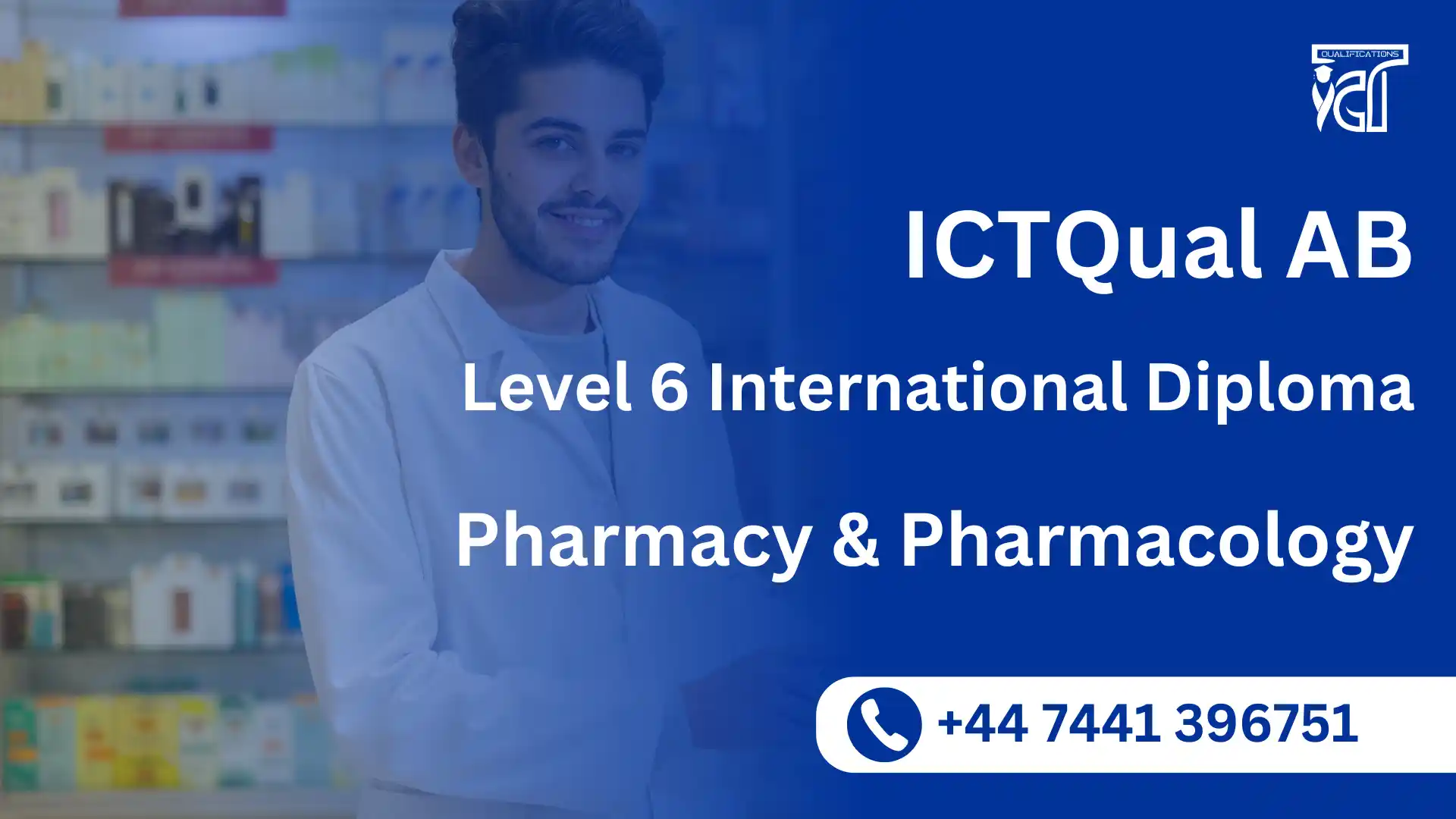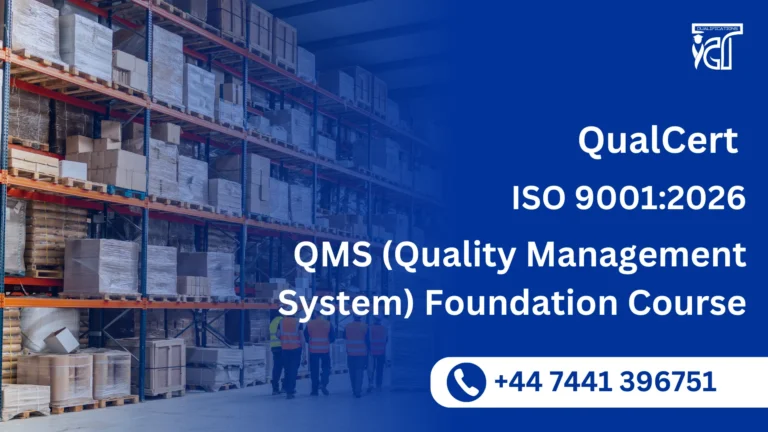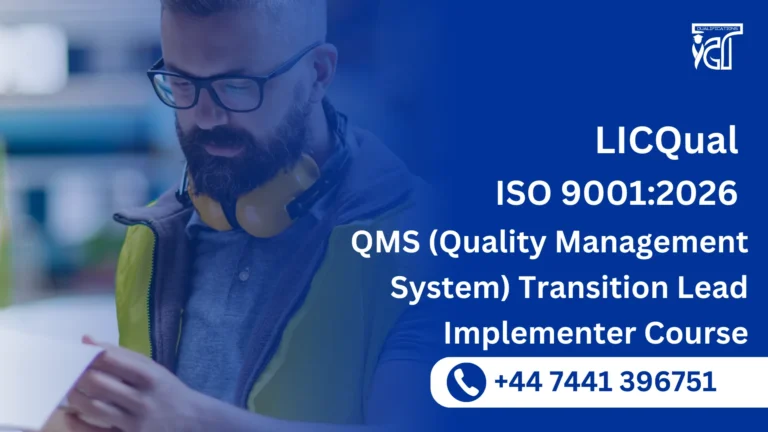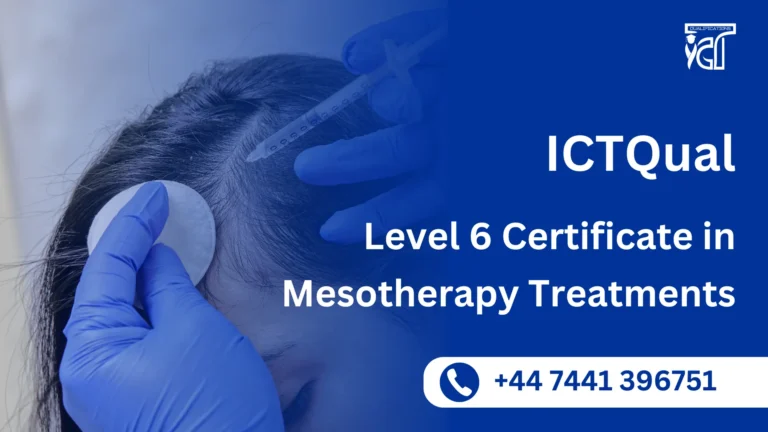The ICTQual AB Level 6 International Diploma in Pharmacy and Pharmacology is a transformative programme designed for learners aspiring to excel in the dynamic field of pharmacy and pharmacology. This comprehensive three-year course, structured around 360 credits, equips learners with advanced knowledge and practical expertise, empowering them to thrive in both clinical and research settings.
Ideal for freshers entering the pharmaceutical sector as well as experienced professionals seeking career progression, the ICTQual AB Level 6 International Diploma in Pharmacy and Pharmacology bridges foundational understanding with cutting-edge industry practices. Learners gain in-depth insight into drug development, pharmacokinetics, clinical pharmacy, and therapeutic management, cultivating skills that are directly applicable to a wide range of healthcare and pharmaceutical roles.
Upon completion the ICTQual AB Level 6 International Diploma in Pharmacy and Pharmacology, learners will be able to demonstrate enhanced analytical and problem-solving abilities, confident clinical decision-making, and proficiency in modern pharmacological techniques. Career pathways include roles in hospital and community pharmacy, pharmaceutical research, regulatory affairs, and healthcare consultancy, offering significant professional growth and international mobility.
Key benefits of the ICTQual AB Level 6 International Diploma in Pharmacy and Pharmacology include a rigorous, practice-oriented curriculum, enhanced employability, and preparation for leadership roles within the pharmaceutical sector. Learners also develop critical thinking, ethical decision-making, and evidence-based practice skills, ensuring they remain competitive in a rapidly evolving global industry.
Whether beginning a professional journey or advancing an existing career, ICTQual AB Level 6 International Diploma in Pharmacy and Pharmacology provides learners with a robust platform for success, fostering expertise, confidence, and long-term professional impact.
ICTQual AB Level 6 International Diploma in Pharmacy and Pharmacology
This qualification, the ICTQual AB Level 6 International Diploma in Pharmacy and Pharmacology 360 Credits – Three Years, consists of 36 mandatory units.
Year 1: Foundation of Pharmacy and Life Sciences
- Introduction to Pharmacy and Pharmacology
- Human Anatomy and Physiology
- Principles of Biochemistry
- Fundamentals of Microbiology
- Basic Pharmaceutical Chemistry
- General Pharmacology
- Pharmaceutical Calculations
- Introduction to Pathophysiology
- Communication Skills in Healthcare
- Health and Safety in Pharmacy Practice
- Pharmaceutical Dosage Forms
- Academic and Research Skills
Year 2: Intermediate Knowledge and Applications
- Organic and Medicinal Chemistry
- Pharmacokinetics and Pharmacodynamics
- Advanced Pharmacology
- Immunology and Biotechnology in Pharmacy
- Pharmaceutics and Drug Formulation
- Analytical Techniques in Pharmacy
- Pharmacognosy and Natural Products
- Clinical Biochemistry
- Hospital and Community Pharmacy Practice
- Drug Legislation and Ethics
- Epidemiology and Public Health
- Research Methods in Pharmacy
Year 3: Advanced Specialisation and Professional Practice
- Advanced Pharmacotherapy
- Clinical Pharmacy and Patient Care
- Toxicology and Safety Pharmacology
- Advanced Pharmaceutics and Novel Drug Delivery Systems
- Biotechnology and Biopharmaceuticals
- Advanced Pharmaceutical Analysis
- Regulatory Affairs and Quality Assurance
- Pharmacovigilance and Drug Safety
- Global Trends in Pharmacy and Pharmacology
- Professional Practice and Leadership in Pharmacy
- Research Project / Dissertation
- Continuing Professional Development and Career Skills
Learning Outcomes for the Level 6 International Diploma in Pharmacy and Pharmacology 360 Credits – Three Years:
Year 1: Foundational Knowledge
By the end of Year 1, learners will be able to:
Introduction to Pharmacy and Pharmacology
- Understand the role and scope of pharmacy and pharmacology within healthcare systems.
- Recognise key responsibilities of pharmacy professionals in patient care.
- Develop a foundational knowledge of medicines and their therapeutic uses.
Human Anatomy and Physiology
- Identify major body systems and their functions.
- Relate anatomical structures to physiological processes.
- Explain how body systems interact in health and disease.
Principles of Biochemistry
- Apply biochemical principles to drug action and metabolism.
- Understand macromolecules, enzymes, and metabolic pathways relevant to pharmacy.
- Analyse the biochemical basis of disease.
Fundamentals of Microbiology
- Recognise the role of microorganisms in health and disease.
- Explain the principles of infection control and antimicrobial therapy.
- Conduct basic microbiological analysis in a pharmacy context.
Basic Pharmaceutical Chemistry
- Understand fundamental chemical principles relevant to drug design.
- Apply concepts of bonding, reactions, and solubility to pharmaceutical science.
- Analyse simple drug molecules.
General Pharmacology
- Understand drug mechanisms, absorption, distribution, metabolism, and excretion.
- Classify drugs based on pharmacological activity.
- Relate pharmacological concepts to therapeutic use.
Pharmaceutical Calculations
- Accurately perform essential pharmaceutical calculations.
- Apply dosage, concentration, and dilution principles in practice.
- Ensure safe and effective medicine preparation.
Introduction to Pathophysiology
- Identify causes and progression of common diseases.
- Explain how pathological processes impact drug therapy.
- Relate disease mechanisms to patient care needs.
Communication Skills in Healthcare
- Demonstrate effective communication with patients and healthcare professionals.
- Apply active listening, counselling, and interpersonal skills.
- Understand cultural and ethical considerations in communication.
Health and Safety in Pharmacy Practice
- Identify risks and hazards in pharmaceutical environments.
- Apply workplace safety standards and infection control practices.
- Ensure compliance with health and safety protocols.
Pharmaceutical Dosage Forms
- Understand different dosage forms and their characteristics.
- Analyse advantages and limitations of various delivery methods.
- Relate dosage forms to patient-specific needs.
Academic and Research Skills
- Develop academic writing and referencing skills.
- Understand basic research principles in pharmacy.
- Use critical thinking to evaluate sources and evidence.
Year 2: Intermediate Proficiency
By the end of Year 2, learners will be able to:
Organic and Medicinal Chemistry
- Understand the structure, function, and synthesis of drug molecules.
- Apply organic chemistry principles to drug discovery and design.
- Analyse chemical modifications to improve drug efficacy.
Pharmacokinetics and Pharmacodynamics
- Understand how drugs are absorbed, distributed, metabolised, and excreted.
- Relate dose-response relationships to therapeutic effects.
- Apply pharmacokinetic models to clinical scenarios.
Advanced Pharmacology
- Explain mechanisms of action of major drug classes.
- Relate pharmacological effects to treatment of common diseases.
- Evaluate therapeutic and adverse effects of drugs.
Immunology and Biotechnology in Pharmacy
- Understand immune system function and its relevance to pharmacology.
- Analyse the role of biotechnology in drug development.
- Explain applications of vaccines, monoclonal antibodies, and gene therapy.
Pharmaceutics and Drug Formulation
- Understand principles of drug formulation and delivery systems.
- Analyse excipients and their role in dosage forms.
- Evaluate methods to enhance bioavailability and stability.
Analytical Techniques in Pharmacy
- Apply spectroscopy, chromatography, and other analytical methods.
- Evaluate purity, quality, and safety of pharmaceutical products.
- Use analytical data to support quality assurance.
Pharmacognosy and Natural Products
- Identify medicinal plants and natural sources of drugs.
- Understand extraction and standardisation of natural products.
- Evaluate the therapeutic role of herbal medicines.
Clinical Biochemistry
- Interpret biochemical tests relevant to patient care.
- Relate clinical biochemistry to diagnosis and treatment.
- Evaluate the role of biomarkers in disease management.
Hospital and Community Pharmacy Practice
- Understand the organisation and function of hospital and community pharmacies.
- Apply dispensing, counselling, and clinical support skills.
- Evaluate pharmacy’s role in improving patient outcomes.
Drug Legislation and Ethics
- Understand legal frameworks regulating pharmacy practice.
- Apply ethical principles in decision-making.
- Ensure compliance with drug safety and professional standards.
Epidemiology and Public Health
- Understand principles of epidemiology and disease prevention.
- Evaluate pharmacy’s role in public health campaigns.
- Apply epidemiological data to healthcare decision-making.
Research Methods in Pharmacy
- Understand research design and methodology.
- Apply qualitative and quantitative methods in pharmacy research.
- Develop skills in data collection, analysis, and interpretation.
Year 3: Advanced Specialization and Application
By the end of Year 3, learners will be able to:
Advanced Pharmacotherapy
- Apply evidence-based pharmacotherapy to complex clinical cases.
- Analyse drug interactions and adverse effects in treatment plans.
- Develop skills for optimising therapeutic outcomes.
Clinical Pharmacy and Patient Care
- Provide patient-centred care through clinical pharmacy practice.
- Apply clinical guidelines in medication management.
- Monitor and evaluate treatment outcomes in real-world settings.
Toxicology and Safety Pharmacology
- Understand toxic effects of drugs and chemicals.
- Analyse safety pharmacology data to predict adverse outcomes.
- Apply risk assessment to pharmaceutical practice.
Advanced Pharmaceutics and Novel Drug Delivery Systems
- Understand innovative approaches to drug delivery.
- Evaluate controlled-release, transdermal, and nanotechnology systems.
- Analyse how advanced formulations improve therapeutic outcomes.
Biotechnology and Biopharmaceuticals
- Understand development and production of biopharmaceuticals.
- Analyse applications of recombinant proteins and therapeutic enzymes.
- Evaluate regulatory challenges of biotechnology drugs.
Advanced Pharmaceutical Analysis
- Apply advanced analytical techniques for quality control.
- Validate analytical methods for regulatory compliance.
- Evaluate pharmaceutical data for clinical and industrial use.
Regulatory Affairs and Quality Assurance
- Understand global pharmaceutical regulations and standards.
- Apply quality assurance practices in drug development.
- Evaluate regulatory submissions and compliance processes.
Pharmacovigilance and Drug Safety
- Understand post-marketing surveillance and drug monitoring.
- Identify and report adverse drug reactions.
- Apply strategies for improving medication safety.
Global Trends in Pharmacy and Pharmacology
- Analyse global healthcare challenges and innovations.
- Evaluate the impact of digital health and telepharmacy.
- Understand international developments in drug research.
Professional Practice and Leadership in Pharmacy
- Apply leadership and management principles in healthcare.
- Develop decision-making, teamwork, and conflict-resolution skills.
- Understand professional accountability and lifelong learning.
Research Project / Dissertation
- Design and conduct an independent research project.
- Apply scientific methods to solve a pharmacy-related problem.
- Present findings in a professional written and oral format.
Continuing Professional Development and Career Skills
- Develop lifelong learning skills for professional growth.
- Apply CPD strategies to enhance pharmacy practice.
- Build career development plans for future progression.
Enrolling in the ICTQual AB Level 6 International Diploma in Pharmacy and Pharmacology offers learners a range of professional, practical, and personal advantages that enhance both career prospects and industry competence:
1. Advanced Industry Knowledge
- In-depth understanding of pharmacology, drug development, clinical pharmacy, and therapeutics
- Prepares learners for practical challenges in the pharmaceutical and healthcare sectors
2. Enhanced Career Opportunities
- Access to roles such as hospital pharmacist, clinical researcher, regulatory affairs specialist, and pharmaceutical consultant
- Opportunities for both local and international employment
3. Practical and Applied Skills
- Hands-on experience in modern pharmacy practices and drug formulation
- Development of patient care and clinical decision-making abilities
4. Leadership and Decision-Making
- Strengthened critical thinking and problem-solving skills
- Enhanced ethical decision-making and readiness for managerial or specialist roles
5. Global Recognition and Professional Credibility
- Completion of an internationally structured programme that demonstrates professional commitment
- Boosts employability and professional reputation in the healthcare industry
6. Comprehensive Learning Experience
- Structured 360-credit, three-year curriculum covering theory, research, and practical application
- Ensures balanced and holistic professional development
7. Long-Term Professional Impact
- Acquisition of transferable skills and industry insight
- Supports continuous career progression and adaptability in a dynamic global healthcare environment
The ICTQual AB Level 6 International Diploma in Pharmacy and Pharmacology is designed for learners from diverse backgrounds who aspire to excel in the pharmaceutical and healthcare sectors. This programme suits both fresh entrants and experienced professionals, equipping them with the knowledge, skills, and confidence needed for career growth and global opportunities. Learners gain a combination of theoretical insight and practical expertise, preparing them for a wide range of professional roles.
1. Aspiring Pharmacy Professionals
- Fresh learners interested in pharmaceuticals, drug development, and clinical pharmacy.
- Individuals seeking a solid foundation in pharmacology and therapeutic management.
- Learners aiming for entry-level roles in hospital, community, or clinical pharmacy.
- Those looking for a structured, internationally recognised programme.
- Students planning further studies or specialisation in pharmacy and pharmacology.
2. Healthcare and Pharmaceutical Practitioners
- Professionals with prior experience in nursing, healthcare, or pharmacy seeking advanced expertise.
- Learners aiming for senior, managerial, or specialist roles in the pharmaceutical sector.
- Individuals updating their knowledge of modern pharmacy practices, drug formulations, and clinical protocols.
- Practitioners bridging practical experience with a formal international qualification.
- Professionals expanding competencies in research, clinical decision-making, and patient care.
3. Career-Oriented Individuals
- Learners focused on improving employability and accessing high-value roles in the pharmaceutical industry.
- Individuals targeting clinical research, regulatory affairs, pharmaceutical consultancy, or hospital pharmacy leadership.
- Those seeking a competitive edge in local and international job markets.
- Professionals aiming to leverage the qualification for better positions or remuneration.
- Learners pursuing professional recognition and credibility through a Level 6 programme.
4. Research and Analytical Enthusiasts
- Learners passionate about scientific research, drug development, and clinical trials.
- Individuals developing advanced analytical, problem-solving, and evidence-based decision-making skills.
- Learners contributing to innovative pharmaceutical solutions, therapy optimisation, and patient safety.
- Those working with clinical data and applying findings to real-world healthcare scenarios.
- Individuals aiming for research-focused roles or higher academic studies.
5. Lifelong Learners and Continuous Developers
- Professionals committed to continuous learning in a dynamic healthcare sector.
- Learners seeking programmes combining theory, practical application, and industry insight.
- Individuals focused on personal growth alongside professional development.
- Those developing leadership skills, ethical decision-making, and advanced clinical knowledge.
- Learners aiming to remain adaptable and resilient in global pharmaceutical environments.
6. Global and International Focus
- Learners seeking internationally recognised credentials enhancing career mobility.
- Individuals meeting the standards of diverse healthcare systems and regulatory environments.
- Professionals aspiring to work in multinational pharmaceutical companies or global hospitals.
- Learners developing cross-cultural understanding of pharmacy and healthcare practices.
- Individuals valuing a qualification demonstrating professional credibility and practical competence worldwide.
Completing the ICTQual AB Level 6 International Diploma in Pharmacy and Pharmacology opens a wide range of career and academic opportunities for learners, providing a strong platform for professional growth and long-term success. The programme equips learners with advanced knowledge, practical skills, and international credibility, enabling them to progress confidently in the pharmaceutical and healthcare sectors.
1. Career Advancement in Pharmacy and Healthcare
- Eligible for senior or specialist roles in hospital and community pharmacies.
- Opportunities in clinical research, pharmaceutical consultancy, and regulatory affairs.
- Pathways to leadership or managerial positions within pharmaceutical companies or healthcare institutions.
- Access to high-demand roles requiring advanced pharmacological expertise.
- Enhanced employability both locally and internationally.
2. Research and Development Opportunities
- Pursue roles in drug development, clinical trials, and pharmacological studies.
- Involvement in scientific research projects and evidence-based healthcare initiatives.
- Opportunities to contribute to innovative pharmaceutical solutions and therapeutic advancements.
- Development of advanced analytical, data interpretation, and research skills.
- Foundation for roles in pharmaceutical laboratories, research institutions, or regulatory bodies.
3. Academic and Professional Growth
- Preparation for further academic qualifications, including postgraduate diplomas or master’s programmes.
- Ability to specialise in niche areas such as clinical pharmacology, pharmacovigilance, or pharmaceutical management.
- Opportunity to enhance professional certifications and continuous professional development (CPD) credentials.
- Access to international networks and professional communities in pharmacy and healthcare.
- Increased recognition and credibility in professional circles and regulatory environments.
4. Global Career Mobility
- Qualification recognised internationally, supporting career opportunities worldwide.
- Enables learners to meet industry standards across different countries and healthcare systems.
- Opens doors to multinational pharmaceutical companies and international healthcare organisations.
- Supports long-term career flexibility and adaptability in evolving global markets.
- Equips learners with transferable skills for diverse professional settings in pharmacy and pharmacology.
Entry Requirements
To qualify for admission into this diploma program, applicants must meet the following requirements:
1. Age Requirement
- Applicants must be 18 years of age or older at the time of enrollment.
- Proof of age may be required, such as a valid passport, national ID, or birth certificate.
2. Educational Background
- Applicants should hold a Level 5 qualification (or equivalent) in one of the following fields:
- Pharmacy
- Pharmacology
- Biomedical Sciences
- Health Sciences
- Other related life science disciplines
- International qualifications will be reviewed for equivalency according to relevant national qualification frameworks or recognized credential evaluation bodies.
3. Work Experience (Alternative Entry Route)
- Applicants who do not have a formal Level 5 qualification may still be considered if they have at least 2 years of relevant work experience in areas such as:
- Pharmacy or pharmaceutical industry
- Clinical research or healthcare services
- Biomedical laboratories or related settings
- Applicants must submit supporting documents, which may include:
- A current CV or resume
- Reference letters from employers
- A description of job roles and responsibilities
4. English Language Competency
- All applicants must demonstrate sufficient proficiency in English through one of the following methods:
- A minimum IELTS score of 5.5, or equivalent in other recognized English tests such as TOEFL or PTE
- Completion of prior education with English as the medium of instruction
- A satisfactory result in the institution’s internal English language assessment (if applicable)
- Exemptions may apply to native English speakers or applicants from countries where English is the official language of instruction.
5. Additional Recommendations
- Although not mandatory, applicants are encouraged to provide the following to strengthen their application:
- A personal statement outlining their interest in the field and future career goals
- Academic or professional references
- Participation in an interview or introductory assessment, if requested
Register Now
Qualification Process
Qualification Process for the ICTQual AB Level 6 International Diploma in Pharmacy and Pharmacology
- Self-Assessment:
Begin by evaluating your eligibility to ensure you meet the qualification requirements, including work experience, knowledge, and language proficiency. - Registration:
Complete your registration by submitting the required documents, including a scanned copy of a valid ID, and paying the registration fee. - Induction:
An assessor will conduct an induction to confirm your eligibility for the course and explain the evidence requirements. If you do not meet the criteria, your registration will be cancelled, and the fee will be refunded. - Assignments & Evidence Submission:
Provide all assignments and the necessary evidence based on the assessment criteria outlined in the course. If you are unsure of the required evidence, consult with the assessor for guidance on the type and nature of evidence needed. - Feedback and Revision:
The assessor will review your submitted evidence and provide feedback. Evidence that meets the criteria will be marked as “Criteria Met,” while any gaps will be identified. You will be asked to revise and resubmit if needed. - Competence Evidence:
Submit final evidence demonstrating that all learning outcomes have been met. This evidence will be marked as “Criteria Met” by the assessor once it is satisfactory. - Internal Quality Assurance (IQA):
The Internal Quality Assurance Verifier (IQA) will review your evidence to ensure consistency, quality, and compliance with standards. - External Verification:
The IQA will submit your portfolio to ICTQUAL AB External Quality Assurance Verifiers (EQA) for final confirmation. The EQA may contact you directly to verify the authenticity of your evidence. - Certification:
Upon successful completion of all checks, ICTQUAL AB will issue your official certificate, confirming that you have attained the ICTQual AB Level 6 International Diploma in Pharmacy and Pharmacology.







